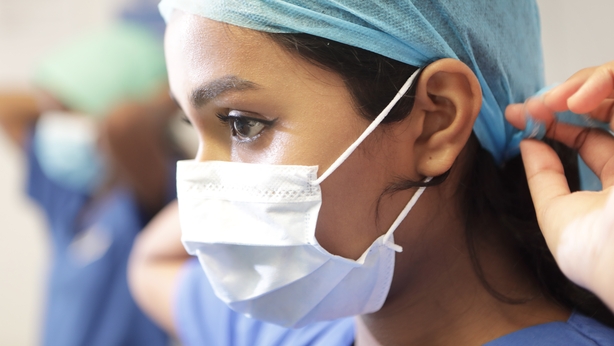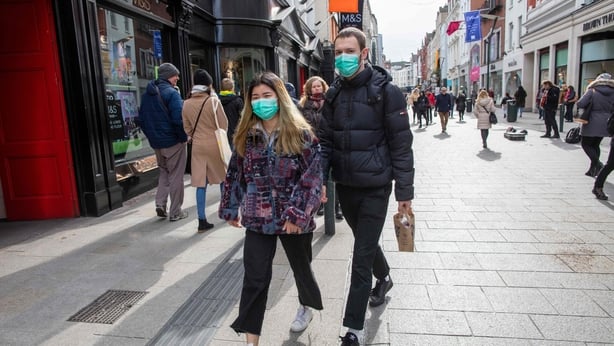The issue of wearing face masks to prevent the spread of Covid-19 in the community has been tricky from the start.
Firstly, there was the major global shortage of Personal Protective Equipment (PPE) for frontline health workers, on whom we all depend. Like health authorities everywhere, the HSE was in a panic, scrambling to secure supplies.
The National Public Health Emergency Team (NPHET) certainly did not want the public to buy up the limited face mask supplies that were available, hence they offered no encouragement.
In a typical year, the HSE usually stocks about 500,000 medical grade face masks for hospital and healthcare use. But when the Covid-19 pandemic struck this year, it was immediately clear that half a million face masks would not even scratch the surface of the amount that was going to be needed.
When the HSE eventually managed to secure a supplier in China, it put in an order for 34 million face masks; that’s 78 times more than they usually need or order in a year.

The second big issue was that face masks were way down the list of priority actions NPHET wanted the public to embrace to stop the spread of the virus. Hand hygiene, cough etiquette, and physical distancing were always the key actions.
Chief Medical Officer Dr Tony Holohan argued repeatedly that the wearing of face masks could engender a false sense of security and distract the public’s focus from the other behavioural changes required.
The third issue brought up repeatedly by Dr Holohan and his team was that the public use of face masks could actually make matters worse.
Wearing a face covering wasn’t just a matter of sticking the mask on your face and off you go; one needed to learn how to handle face masks properly – how to put them on and take them off without contaminating them, and what to do about cleaning them.
In addition, it was believed people would be more inclined to touch their face more often with a mask on. Every time that happened there would be an increased risk of infection.
Those were the arguments used repeatedly every time the use of face masks by the public was raised at the daily press Covid-19 briefings at the Department of Health.
On one level, not a lot has changed since then. We still have disagreement over the pros and cons of the public wearing masks. It is still clear that hand hygiene, cough etiquette and physical/social distancing is the key to containing the spread of the virus.
Read more:
Virus expert seeks to clarify use of face masks
Expert says evidence around cloth masks ‘not fantastic’
New guidelines outline future of shopping centre visits
Both the World Health Organisation (WHO) and the European Centre for Disease Control (ECDC) have emphasised how important it is that the wearing of face masks is not seen as a substitute for the key behavioural changes that have already delivered success.
But on another level, a lot of things in the debate around face masks have changed. The panic over the global supply of PPE has declined, the incidence and spread of the disease among the community has been suppressed, and several countries are claiming significant success in tackling the virus through the public use of face coverings. The world now knows a lot of new information about how the virus spreads that we did not know even three month ago.
Among the most worrying is the new knowledge that people who are infected but do not have symptoms are highly capable of spreading the virus. We also now know that infected people tend to be particularly infectious in the two to three days before their own symptoms materialise. These two key pieces of information have been game changers and have caused a significant rethink about the use of face masks by the public.
The ECDC and the WHO have both examined all the evidence again. Independently of each other, they have weighed up all the pros and cons and the risks and benefits around face masks, and concluded there is indeed a strong case for governments and health authorities to encourage citizens to embrace wearing them in certain situations.
The up-to-date advice from both organisations is that face masks should be considered when visiting busy closed spaces such as grocery stores, shopping centres, and other such spaces. They also recommend their use on public transport including buses, trains and airplanes, and for certain workplaces and professions that involve physical proximity to other people.

Neither organisation believes that face coverings will prevent the wearer from contracting the disease, but both are in strong agreement that face coverings can play a positive role in limiting the spread of droplets containing the virus from an infected person whenever they cough, talk, shout or laugh.
They are in agreement also that the wearers of face masks should not be stigmatised or seen as individuals who are trying to protect themselves from people all around them.
Rather, those who wear face masks should be seen as people trying to protect everyone they meet from the possibility that they (the face mask wearer) could be asymptomatic and unknowingly spreading the disease.
The ECDC goes so far as to suggest that wearing face masks should be promoted as a new form of social solidarity in the fight against COVID-19.
All of the concerns about the incorrect usage of face masks by members of the public remain, and more public education and instruction in the proper and safe use of face masks is certainly needed.
The WHO has just published a check list of “do’s and dont’s” related to non-medical fabric face masks for the public.
To describe it as a common sense list would be to completely underestimate how challenging it is likely to be for ordinary people to get it right. It is going to be quite hard for most people to follow these rules.
The do’s:
-Clean your hands before touching the face mask.
-Inspect the mask for damage or dirt before you wear it.
-Adjust the mask to your face without leaving gaps at the side.
-Make sure the mask covers your mouth, nose and chin.
-Avoid touching the mask when it is on.
-Clean your hands before removing the mask.
-Remove the mask by the straps behind your ears or head.
-Pull the mask away from your face.
-If you plan to re-use the mask store it in a clean plastic re-sealable bag provided it is not dirty or wet.
-Remove the mask by the straps when taking it back out of the storage bag.
-Wash the mask in soap or detergent, preferably with hot water, at least once a day.
-Clean your hands after removing the mask.
The don’ts:
-Do not use a mask that has been damaged.
-Do not wear a loose mask.
-Do not wear the mask under your nose.
-Do not remove the mask when there are people within one metre.
-Do not use a mask that is difficult to breathe through.
-Do not wear a dirty or a wet mask.
-Do not share your mask with others.
Why wear a face mask or face covering?
Arguments for:
-To prevent the spread of the Covid-19 virus from asymptomatic individuals.
-It reduced community transmission of SARS in 2003 in Asian Countries that use them.
-Can use a range of easily produced textiles, and are washable and reusable.
Arguments against:
-They are in short supply and healthcare workers need them more.
-No direct scientific evidence that they stop the spread of the virus.
-Only limited indirect evidence of effectiveness.
-Need to carefully put them on and off to prevent self contamination.
-Not well tolerated by certain groups including children.
-No established standards for materials or manufacture.
Read more:
The latest coronavirus stories
 The Argus Report Read about it!
The Argus Report Read about it!





